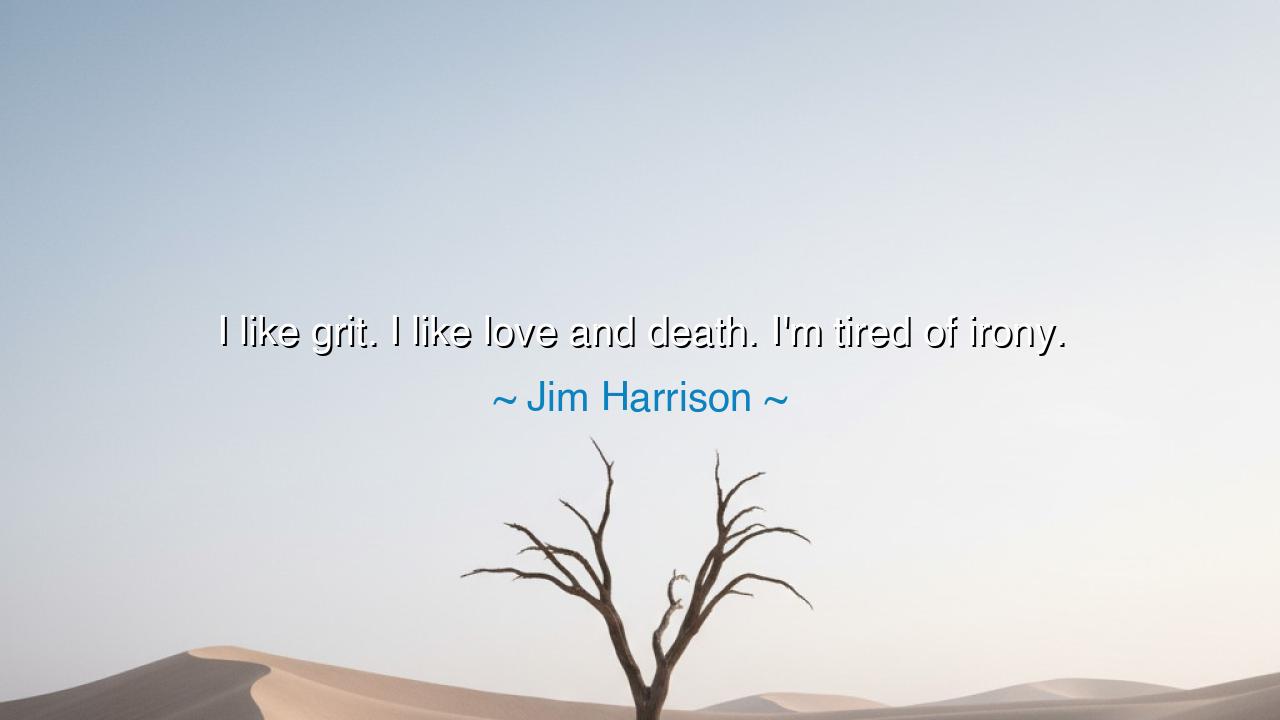
I like grit. I like love and death. I'm tired of irony.






The words of Jim Harrison — “I like grit. I like love and death. I’m tired of irony.” — strike like a declaration of the soul’s longing for what is real. In an age of pretense, of clever masks and hollow laughter, Harrison’s cry is one of return — a call to the elemental truths of human life. To like grit is to love the roughness of existence, the dust and struggle that make life authentic. To like love and death is to accept both the ecstasy and the finality that define the human journey. And to be tired of irony is to reject the detachment of modern hearts, those who mock what they cannot feel. Harrison, poet of the wilderness and wanderer of the soul, reminds us that life’s deepest beauty lies not in sophistication, but in honesty — raw, imperfect, and true.
Jim Harrison, born in 1937, lived as a man of the earth — hunter, poet, philosopher. He wrote of rivers, hunger, and solitude, of wild country and the wild heart within man. His stories, such as Legends of the Fall, carried the spirit of the frontier — not just of land, but of being. When he said he liked “grit,” he spoke of the courage to face life without illusion. To Harrison, grit meant endurance, the willingness to taste both the bitter and the sweet, to stand firm against despair and to live with both hands in the soil of experience. His words are a rejection of the shallow — a plea to feel again, to love again, to live deeply even when it hurts.
When he said he liked love and death, he was naming the two poles of human existence — the forces that define us and strip us bare. Love lifts us from the ordinary; it demands vulnerability, surrender, and faith in another. Death, its mirror, humbles us, reminding us that everything we hold will one day pass away. Harrison saw in both not tragedy, but truth. To embrace love and death is to embrace the fullness of being alive — to allow the heart to break, to heal, to beat still. Those who avoid pain also avoid passion, and thus live half-lives, safe but hollow. For Harrison, the real life — the gritty life — is one lived close to these fires, where joy and loss burn side by side.
His weariness with irony is a rebuke to the age of cynicism. Irony, once a tool of wit and wisdom, has become the armor of the fearful — a way to mock rather than to feel, to distance oneself from sincerity. In Harrison’s eyes, irony was the disease of modern man — a symptom of emotional cowardice. Better to stumble in passion than to glide in apathy. The man who laughs at love, who sneers at meaning, who hides behind cleverness, may be safe from pain — but he is also cut off from wonder. Harrison’s words demand that we feel without irony, that we look at the world not through a smirk, but through the clear eyes of awe and compassion.
Consider the story of Ernest Hemingway, whose life, like Harrison’s, was carved by grit, love, and death. Hemingway fished in the sea, fought in wars, loved fiercely, and wrote of courage and despair with a simplicity that cut like truth. His characters bled, failed, endured. There was no irony in his art, only the struggle to live with dignity in a world of loss. Hemingway, like Harrison, believed that man’s greatness lies not in escaping pain, but in facing it. In both men, we see the same creed: that to be human is to wrestle with life honestly, without disguise — to taste the salt of the earth and call it good.
Harrison’s declaration, though spoken in modern times, carries the wisdom of the ancients. The old philosophers — from Marcus Aurelius to Lao Tzu — also rejected pretense and sought the real. They knew that meaning is found not in comfort, but in contact: with nature, with truth, with one’s own soul. To live without irony is to live like a tree — rooted, open to the sun and the storm alike. It is to accept that suffering and beauty are intertwined, that joy cannot exist without loss. The wise do not flee from this paradox; they bow before it.
So, my children, hear this teaching: Seek grit, not glitter. Do not fear the sweat of labor or the ache of love; they are proof that you are alive. Do not hide behind irony, for detachment is the death of the spirit. Speak sincerely, love passionately, and face death with grace. When life wounds you, do not curse the pain — let it teach you compassion. When joy visits you, do not analyze it — let it fill you. Be brave enough to live without disguise. For as Jim Harrison reminds us, the soul grows strong not in pretense, but in truth — and the truest life is lived in the open, where grit, love, and death meet beneath the wide, unflinching sky.






AAdministratorAdministrator
Welcome, honored guests. Please leave a comment, we will respond soon